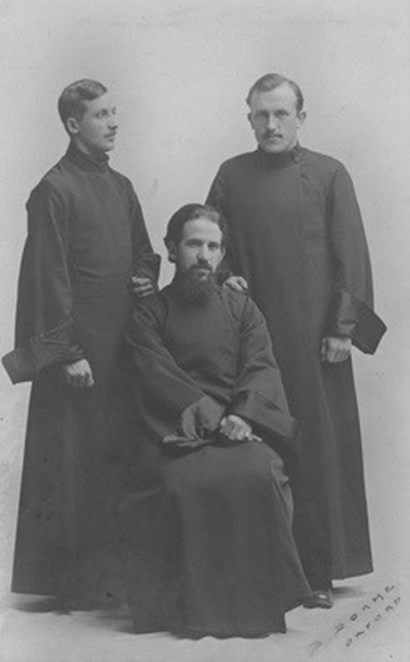Serbian relations celebrated at Oxford
September 28, 2018.
The refuge provided to Serbian seminarians during the First World War, and the subsequent impact that these men had on the Church and the world, were recalled at Pusey House this month.
The placement of the Serbian theological refugees, accompanied by some of their professors, took place with the enthusiastic support of the then Archbishop of Canterbury, Randall Davidson. Some stayed in Oxford after the war. In total, 55 men studied at Cuddesdon, Dorchester, and St Stephen’s House, at a time when, contemporary Church Times reports note, the Serbian Church was “in abeyance. . . Their seminaries are closed, their students dispersed, many of their leaders are interned.” The refugees arrived, a report noted, “in sheepskins and goatskins, like the victims of Antiochus”. While not all were canonised, several became bishops, religious philosophers and theologians, and state officials in the Kingdom of Yugoslavia.
The symposium at Pusey House, which was addressed by Serbian theologians, was more than a reflection on events a hundred years ago, Canon Mark Chapman, Vice-Principal of Cuddesdon and Professor of the History of Modern Theology at Oxford University, said this week. “We discussed how the Churches might collaborate on educational projects into the future.”
The talks, which were heard by about 40 participants, including many Serbs, testified to the accuracy of a contemporary prediction that those who came to England would prove to be the “future leaders of the Serbian Church”.
 Serbian B. Litt. students at St Stephen's House, Oxford, c.1916-19: left to right: Demosten Ilic, teacher to Serbian seminarians at Cuddesdon; Justin Popovic (St Justin the New of Celije); and Irinej Djordjevic, later Vicar Bishop of Srem, and Bishop of Dalmatia
Serbian B. Litt. students at St Stephen's House, Oxford, c.1916-19: left to right: Demosten Ilic, teacher to Serbian seminarians at Cuddesdon; Justin Popovic (St Justin the New of Celije); and Irinej Djordjevic, later Vicar Bishop of Srem, and Bishop of Dalmatia
Professor Bogdan Lubardic and Professor Andrej Jeftic, both of the University of Belgrade, spoke about Fr Justin Popovic, an Orthodox theologian canonised in 2010. Professor Angela Berlis, of the University of Bern, and Professor Aleksandar Djakovac, of the University of Belgrade, spoke about Nikolaj Velimirovic, a charismatic church leader and theologian who preached in England during the First World War He became Bishop of Ohrid and Žica, and was canonised in 2003. Both men “gained pan-Orthodox acclamation as theologians, spiritual fathers, and as outspoken critics of the Communist regime”.
A contemporary Bishop, the Rt Revd Isihije Rogic, spoke of the “ecclesial and ecumenical implications” of the presence of Serbian clergy in England during the war.
The atmosphere at the symposium was “extremely warm and engaged”, Professor Chapman said. “I think there is genuine desire [in Serbia] to build up ecumenical relations, particularly with England, because of this history. . . We are hoping that there might be links between seminarians.”
His contribution explored the relationship between the C of E, Serbia, and the Serbian Orthodox Church, a topic he explored in Theology at War and Peace (Routledge, 2016), in which he describes “a concerted effort across the whole of the Church of England to raise the profile of the Serbian Church and of Serbia more generally” after a tour by Fr Velimirovic in 1916.
Source: Church Times